Introduction:
The two most famous and strong e-commerce platforms are Magento and Shopify. Although both systems have strong features and capacities to fit companies of all kinds, they also vary greatly, which might greatly affect your e-commerce operations.
More than 140,000 websites are currently live that use Magento, according to the most latest data. With about 4.7 mln. active e-commerce websites, Shopify is chosen as an e-commerce platform in 6% of situations, whereas Magento is picked only in 0.7%.
Let’s witness the battle of Magento vs Shopify here. Examining the features, usability, cost, security, and more of Magenta vs Shopify in this thorough comparison will help you decide which platform best fits your online business.
What is Magento?
The open-source eCommerce platform Magente is well known for its scalability and adaptability. Some of the biggest online retailers in the world utilize this strong solution, which provides a broad spectrum of tools fit for certain company requirements.
Two versions of Magento are available: free-to-use Magenta Open Source (previously Magenta Community Edition) and Magenta Commerce (formerly Magenta Enterprise Edition), which have more capabilities and premium support.
Pros of Magento
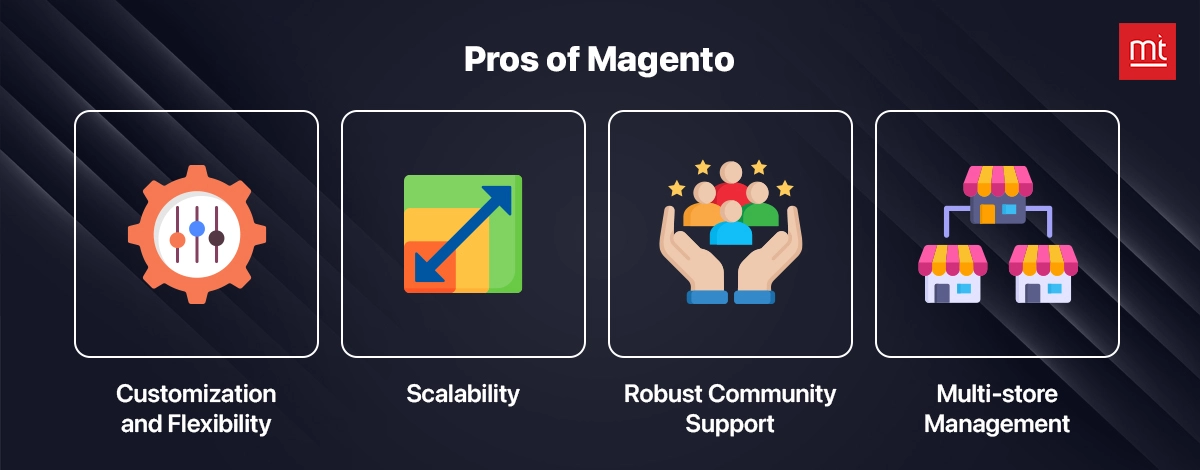
1. Customization and Flexibility
Because Magento is open-source, developers may completely personalize the platform to fit certain corporate needs. This adaptability is perfect for companies with particular demands for which standard solutions fall short.
2. Scalability
Magento is so scalable companies of all kinds—from tiny startups to big corporations—should find it appropriate. Magento can manage more traffic and transactions as your company expands without sacrificing speed.
3. Robust Community Support
Using forums, tutorials, and extensions, Magento's vast and active community of developers, designers, and users helps to shape the platform.
4. Multi-store Management
Magento lets companies handle many product lines or market segments by letting them run several shops from one dashboard.
Cons of Magento
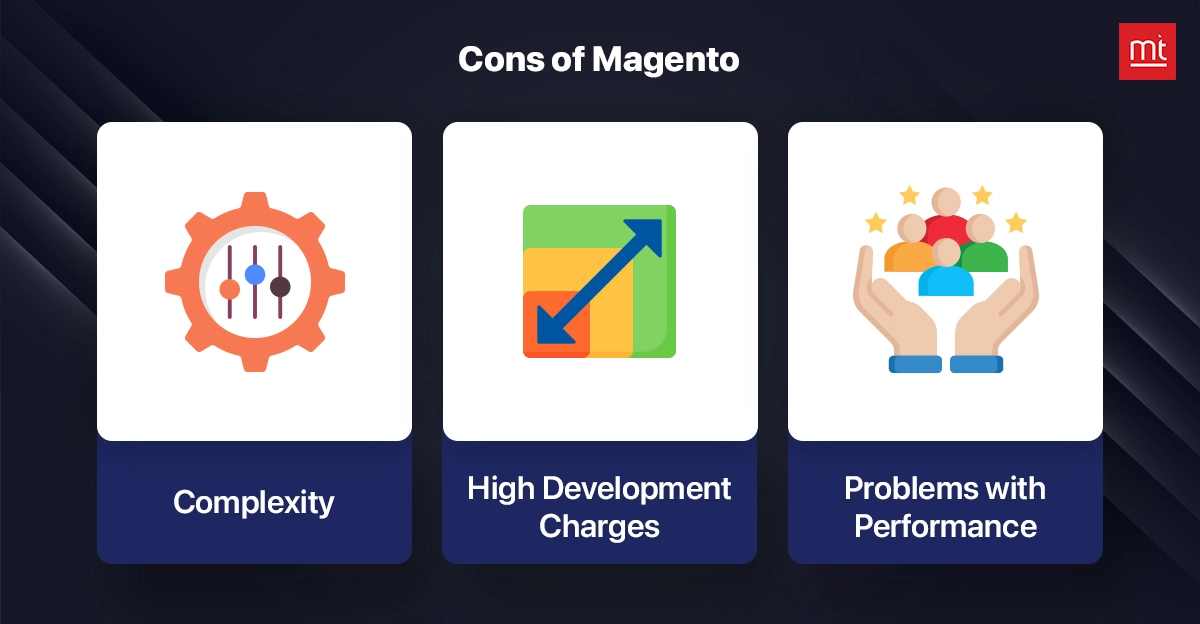
1. Complexity
Magento's strong capabilities have a high learning curve, and mastering them will require significant time and financial commitment. For non-technical people, it is less easily navigable.
2. High Development Charges
Often pricey, customizing and maintaining a Magento shop needs expert dedicated developers. Furthermore, security services and hosting contribute to the total cost.
3. Problems with Performance
Magento may be resource-intensive without appropriate optimization, which would cause slower load times—especially for big companies with plenty of catalogs.
Features of Magento
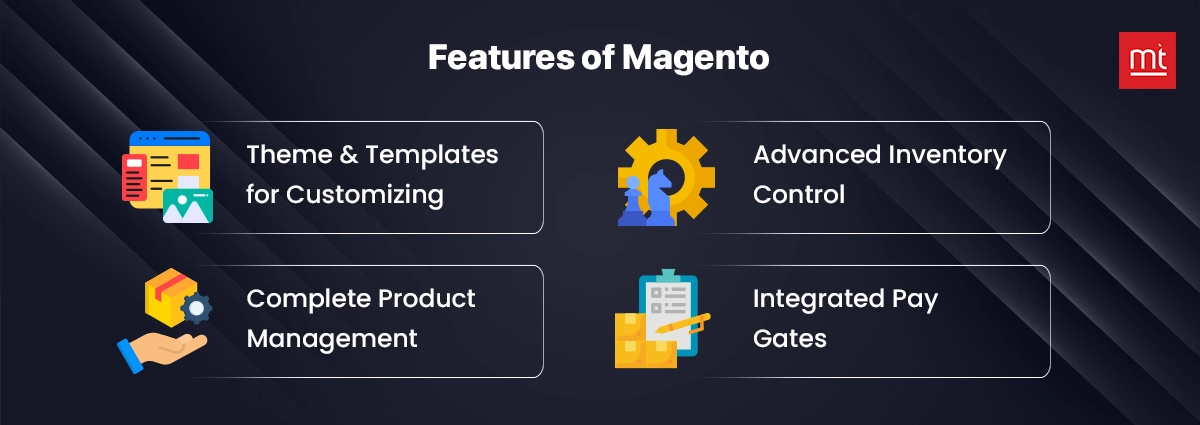
1. Theme & Templates for Customizing
Magento provides many themes and designs you can adapt to your brand.
2. Complete Product Management
Simple, adjustable, downloadable, virtual items are among the many products Magento provides.
3. Advanced Inventory Control
Magento's features enable companies to monitor stock levels, control vendors, and simplify order fulfillment.
4. Integrated Pay Gates
Magento facilitates accepting payments from clients worldwide by supporting many payment gateways, saving companies time.
What is Shopify?
Shopify is a fully hosted eCommerce platform renowned for simplicity and rapid setup. Small to medium-sized companies seeking a hassle-free approach to begin selling online will find it perfect. Without sophisticated technical skills, Shopify offers all the tools to build, alter, and run an online business.
Pros of Shopify
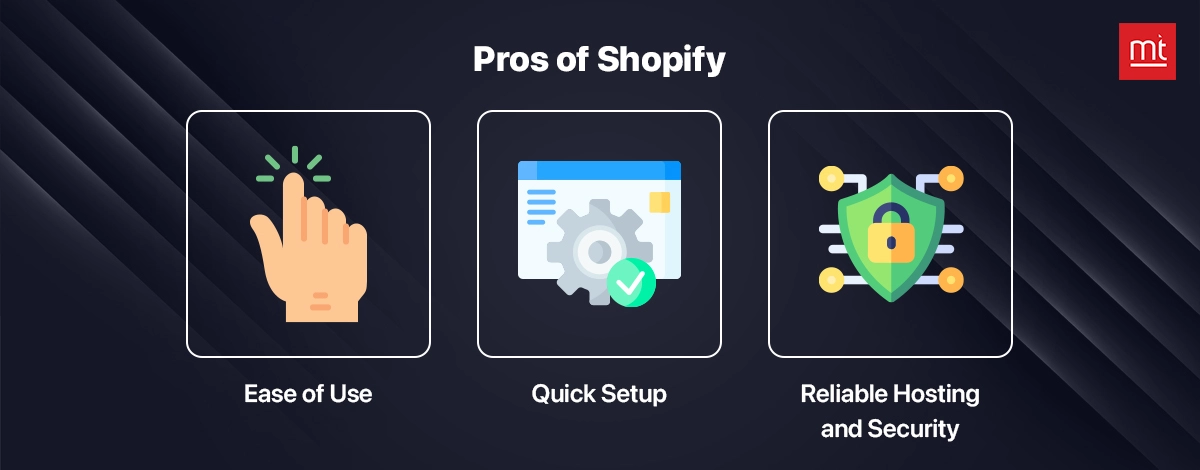
1. Ease of Use
Even without technological knowledge, anybody can easily set up and run an online business thanks to Shopify's simple interface. The platform lets customers concentrate on operating their company as it manages all technological details.
2. Quick Setup
The hosted solution from Shopify lets companies get going fast. Launching your business in a few hours is possible with built-in themes, payment methods, and a drag-and-drop store builder.
3. Reliable Hosting and Security
Providing a consistent and safe space for your online business, Shopify handles hosting, security, and upgrades. This covers PCI compliance for secure payment processing and SSL certifications.
Cons of Shopify
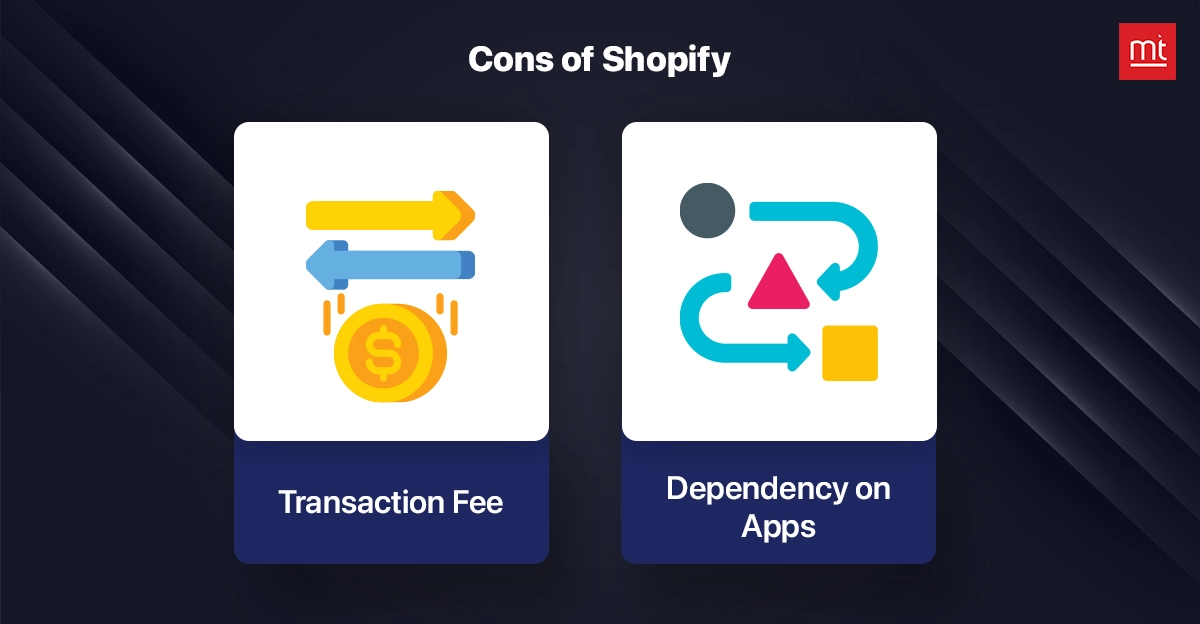
1. Transaction Fee
Shopify Payments is the exception; the platform charges transaction fees for utilizing other payment gateways. This might increase your business's operational expenses in general.
2. Dependency on Apps
You could have to rely on other applications to provide certain features, which would raise expenses and lead to dependencies on outside developers.
Features of Shopify
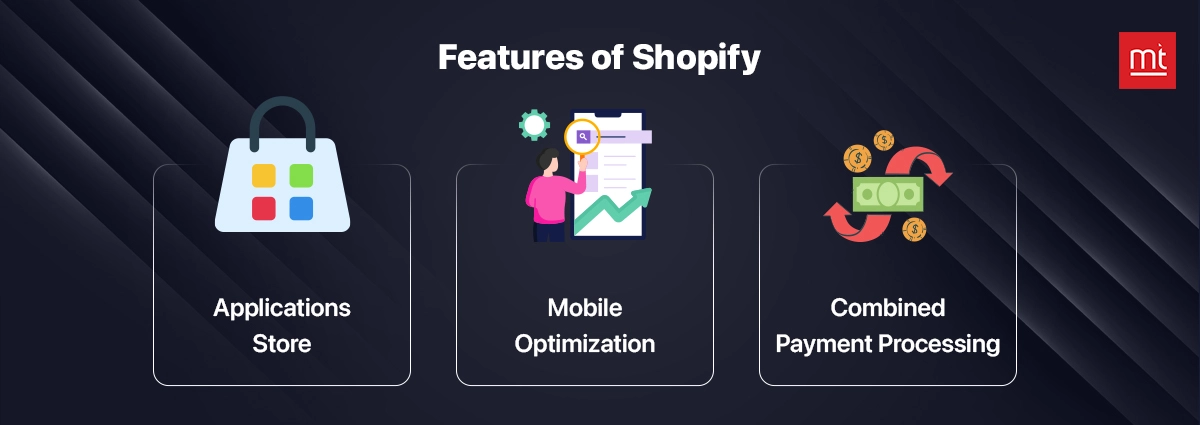
1. Applications Store
From inventory control to SEO tools, dozens of applications on Shopify's App shop may help your shop be more functional.
2. Mobile Optimization
Responsive themes from Shopify ensure your shop looks fantastic on all devices—including tablets and smartphones.
3. Combined Payment Processing
Shopify provides a range of payment gateways, including its own Shopify Payments, which provide easy integration and reduced rates.
Key Differences Between Shopify and Magento (Magento vs Shopify)
Here are some of the major differences between Shopify and Magento to choose the right solution for your online store.
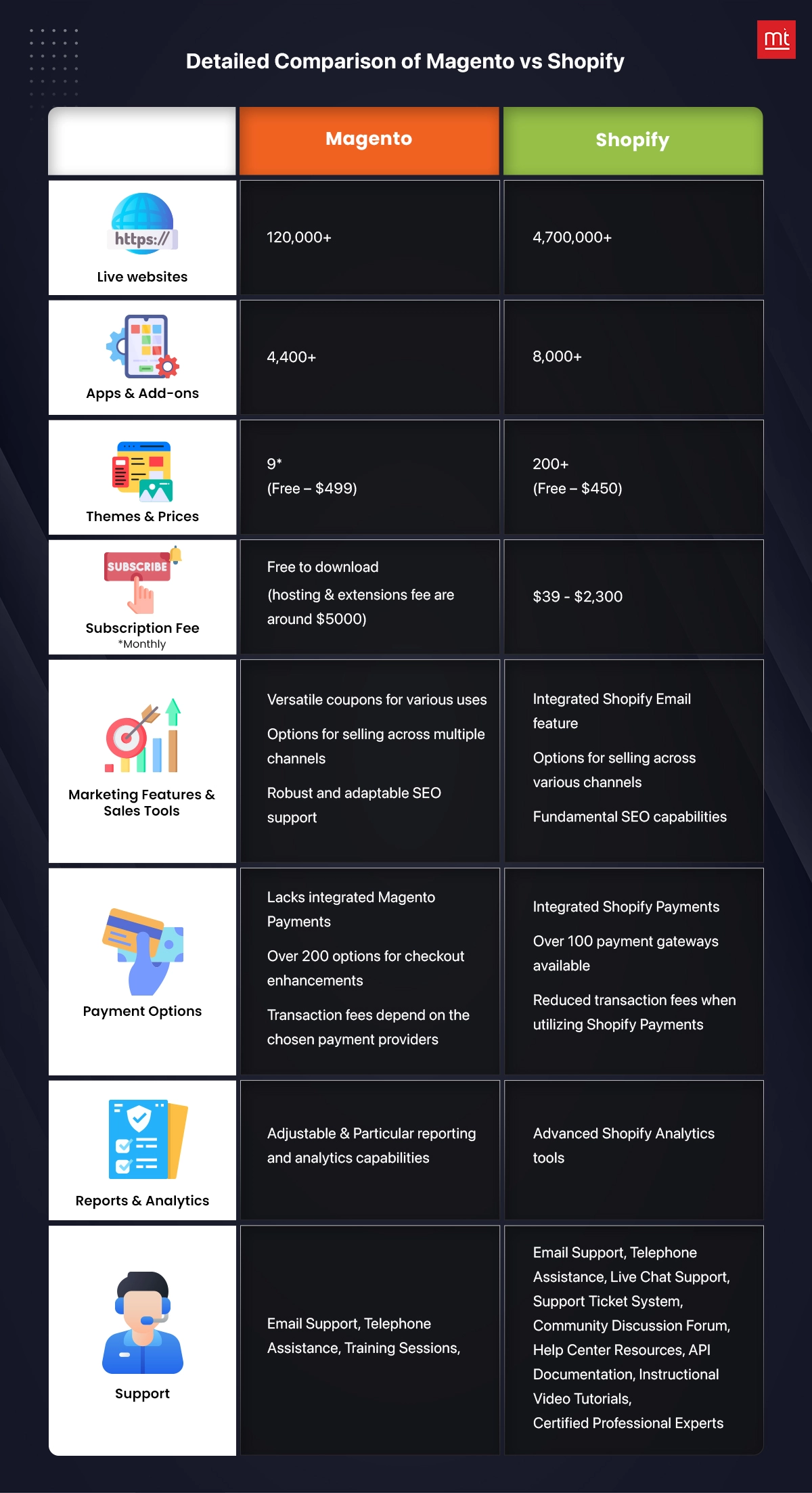
#1. Web Development and Coding
Being an open-source platform, Magento lets one extensively customize using code. Built on PHP, it depends on a strong knowledge of web programming to properly use its possibilities. Conversely, Shopify is a closed-source platform that requires no coding experience for setup and operation. The simplicity of Shopify comes at the price of customizing as the platform lets just what it allows.
#2. Usability
With its simple interface that lets people run their businesses without technical knowledge, Shopify is meant for simplicity. However, Magento is more complicated and requires a committed group of engineers to run the business effectively. For small- to medium-sized companies who choose a simpler solution, Shopify's user-friendly interface is a major benefit, even if Magento gives greater power and customization choices.
#3. Pricing
Operating on a subscription-based approach, Shopify charges basic to advanced depending on the services and support required. Apart from the monthly charge, applications, themes, and transaction fees might add to the expenses. Magente's price is more complicated. Though you must budget for hosting, security, and development expenses, the open-source edition is free. The enterprise-level option, Magento Commerce, has a hefty price tag including support and premium features.
#4. Security
Though the degree of responsibility varies, Shopify and Magento have robust security measures. Shopify is a more hands-off option for users as it controls all security elements, including PCI compliance, updates, and fixes. Being self-hosted, Magento calls on you to oversee security, including updating your systems and guaranteeing industry-standard compliance. This increases your responsibility as well as your control.
#5. Customizing
Customizing is where Magento shines; it lets companies make every feature of their online shop fit certain requirements. This covers the capacity to design bespoke modules, interface with many outside services, and generate original features. Although Shopify provides a decent degree of customization, it is less versatile overall. It offers a variety of themes and tools, although substantial customizing usually calls for working within the platform's limitations.
#6. Plugins
Thousands of plugins and extensions abound on Magento's vast market, most of which are created by the community. From sophisticated statistics to marketing tools, these plugins address various uses.
Though they are typically paid for and may include membership fees, Shopify's App Store also provides many applications. Although both systems provide plenty of choices to enhance the capability, Magento's open-source character gives it an advantage regarding the number of accessible plugins.
#7. Shipping and Inventory
Shopify lets you establish shipping prices depending on different factors and provides built-in solutions for handling inventory and delivery, including connections with big carriers. Additionally, it offers automatic low-stock level alerts and real-time inventory monitoring.
Magento's shipping and inventory management tools are more sophisticated, supporting several warehouses, bespoke shipping rules, and thorough inventory reporting. These characteristics may call for more setup and configuring.
Why Choose ManekTech for Shopify Development?
Selecting ManekTech for your Shopify development requirements guarantees that you will gain from a staff of knowledgeable builders and optimizers of Shopify shops. ManekTech develops custom solutions that fit your company's particular needs, assuring that your online shop not only looks fantastic but also runs well. Our knowledge includes anything from sophisticated app connections to bespoke theme design, helping your shop stand out in a crowded market.
ManekTech offers continuous support and maintenance to guarantee your Shopify shop is current with the newest security measures and features. We are your consistent partner for your e-commerce success because, using a data-driven strategy, we concentrate on improving your business for improved performance, greater conversion rates, and an enhanced consumer experience.
Conclusion
Your company size, technical knowledge, budget, and particular demands will all affect which of Magento and Shopify you choose. Magento is a great option for companies needing great control over their e-commerce operations, scalability, and extensive customizing. Still, it comes with more expenses and complexity. Conversely, Shopify is best for companies seeking a simple, all-in-one solution that handles technical issues for you. Small to medium-sized companies use it mostly for its simplicity, dependability of hosting, and strong support.
Ultimately, your company's ideal platform will rely on your objectives and resources. Making a wise choice that positions your online shop for success requires carefully weighing the advantages and drawbacks of every platform and determining how they fit your company's objectives.
About Author
Subscribe to Our Newsletter!
Join us to stay updated with our latest blog updates, marketing tips, service tips, trends, news and announcements!


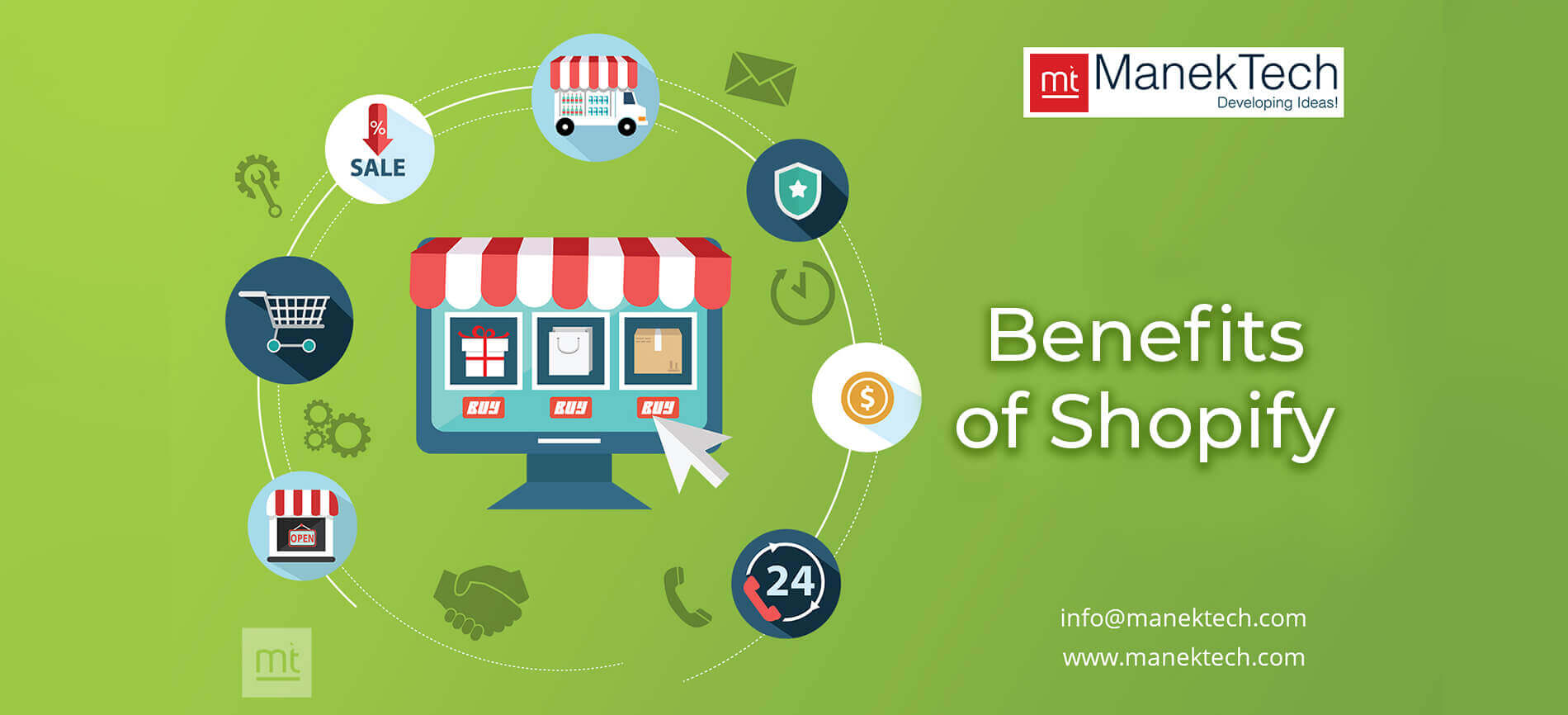

![Social Commerce: The Future of Online Shopping [A Complete Guide]](https://www.manektech.com/storage/blog/image/1723027013.webp)















